The title, a contradiction in terms, was the first novel written by Camus, when he was in his mid-twenties. However, it was only published post-humously, and is considered to be a precursor to Camus' more widely-acclaimed The Stranger(also known as The Outsider, to obfuscate matters). It has been a long time since I've read The Stranger, and the details are a bit sketchy, so I shall refrain from comparing the two books, but instead focus solely on this one, which Camus never intended to publish. This book does not read in chronological order; in the opening chapter, the protagonist Mersault murders a man in a wheelchair, and steals his fortune. The crime is committed in seemingly cold blood, and as Mersault leaves the man's house, clinging to his newfound fortunes, the environs is detailed.
Millions of tiny white smiles thronged down from the blue sky. They played over the leaves still cupping the rain, over the damp earth of the paths, soared to the blood-red tile roofs, then back in the lakes of air and light from which they had overflowed. A tiny plane hummed its way across the sky. In this flowering of air, this fertility of the heavens, it seemed as if a man's one duty was to live and be happy.
The means justify the end, is the stance that Camus takes. Kant's deontological premise that the motivation or will behind a person's action drives whether an action is morally good or not, does open up a plethora of interesting questions. What motivated Mersault to kill Zagreus? While the above verbatim snippet represents sheer hedonism, as one reads on, the conclusion drawn drifts from the original opinion formed. In a philosophical conversation, the victim told the murderer:
"You see, Mersault, for a man who is well born, being happy is never complicated. It's enough to take up the general fate, only not with the will for renunciation like so many fake great men, but with the will for happiness. Only it takes time to be happy. A lot of time. Happiness, too, is a long patience. And in almost every case, we use up our lives making money, when we should be using our money to gain time."
It was in that conversation that Zagreus revealed that he was tempted to take his own life, and he had built his fortunes prior to the accident that led to him being a double leg amputee. He conceded that in his present state, he did not have a shot at happiness, but as long as Mersault wasn't weighed down with monetary obligations and necessities, Mersault should undertake the quest for happiness. Could one almost look at this as a case of assisted suicide? Or, considering Zagreus was physically capable of taking a gun to his own head, but emotionally not, this was plain simple murder. Mersault does walk scott-free though. No ramifications, no repercussions.
Mersault's quest for happiness is not smooth-sailing though. He travels through Europe, visits old friends, gets married to a woman he does not love, and buys a house in the country. For a long time, through his journey, his conscience pricks him, and he is unable to truly indulge in epicureanism. Yet, eventually, while consciously attempting to create happiness, it dawns unto him:
He realized now that to be afraid of this death he was staring at with animal terror meant to be afraid of life. Fear of dying justified a limitless attachment to what is alive in man. And all those who had not made the gestures necessary to live their lives, all those who feared and exalted impotence—they were afraid of death because of the sanction it gave to a life in which they had not been involved. They had not lived enough, never having lived at all.
I was intrigued and fascinated by the first half of this extremely short book. While some threads (how Zagreus and Mersault met) came across as far-fetched, the character developments, and the conversations between the two were mind-blowing. Mersault is the antihero who is not really likeable. Through the book, it is impossible to sympathise or empathise with him, and when as the end of the book approaches, as a reader, I almost hoped for an ironic ending, which did not tally with the title.
The second half of the book I struggled through. His friends and his wife were not memorable, and their characters fizzled out as quickly as they emerged. Their lives bordered on mere fatuousness, and were abundant with selfishness (as Comte would define it, not Rand). Existentialism is at the crux of the novel, and yet, the emphasis on living in a meaningless world, and seeking out happiness at any cost, just leaves one contemplating humanity. Not in a good way.
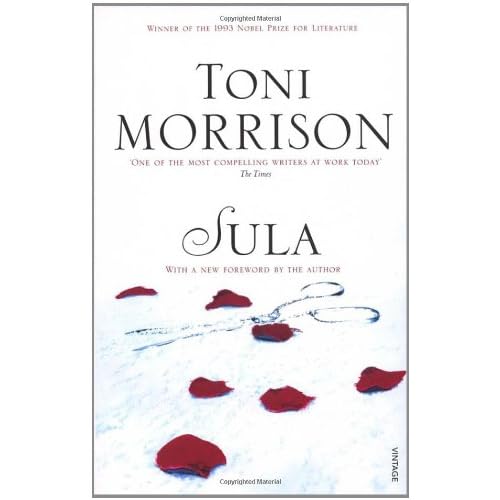 Spanning almost forty-five years (1921-1965), Sula revolves around two best friends: Sula and Nel, and how their friendship evolves and implodes over the years.
Growing up in a poverty-stricken black town in Ohio called Bottom, Sula is accustomed to men coming and going, as they please. Her mother and grandmother are fiercely independent women, and after her father died, her mother (Hannah) is keen for companionship, and doesn't really care if the man is married or not. Still, Hannah is well-liked, despite sleeping with half the married men in the town... That stands testimony to the richness of the characters - that Morrison can make someone quite despicable come across as a lovely person.
Spanning almost forty-five years (1921-1965), Sula revolves around two best friends: Sula and Nel, and how their friendship evolves and implodes over the years.
Growing up in a poverty-stricken black town in Ohio called Bottom, Sula is accustomed to men coming and going, as they please. Her mother and grandmother are fiercely independent women, and after her father died, her mother (Hannah) is keen for companionship, and doesn't really care if the man is married or not. Still, Hannah is well-liked, despite sleeping with half the married men in the town... That stands testimony to the richness of the characters - that Morrison can make someone quite despicable come across as a lovely person.
 After reading
After reading 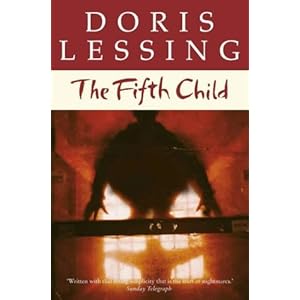 By virtue of Doris Lessing being a Nobel Laureate, her books have always intimidated me. The size of the one book I've heard about the most, The Golden Notebook, hasn't really helped. However, when I stumbled upon The Fifth Child at the library, I felt as though I had to try reading at least one of her books. I've read
By virtue of Doris Lessing being a Nobel Laureate, her books have always intimidated me. The size of the one book I've heard about the most, The Golden Notebook, hasn't really helped. However, when I stumbled upon The Fifth Child at the library, I felt as though I had to try reading at least one of her books. I've read 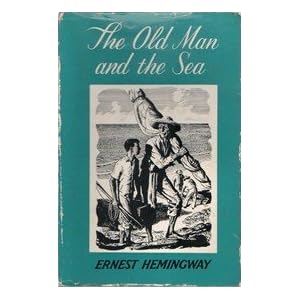 I have an absolutely ancient copy of this book lying around, and it's actually bizarre that I've not read the book yet - it's just 114 pages long! Published in 1974, the book cost just 30p at the time (US$0.45)! The book costs £7.99 now... let's keep that musing for another day!
The Old Man and the Sea is an extremely 'concise' book, for the lack of a better word. The plot is uncomplicated, with minimal dialogue. It's literally about an old man and the sea, as the old man (Santiago) tries to change his luck, after going eighty-four days without catching a fish.
I have an absolutely ancient copy of this book lying around, and it's actually bizarre that I've not read the book yet - it's just 114 pages long! Published in 1974, the book cost just 30p at the time (US$0.45)! The book costs £7.99 now... let's keep that musing for another day!
The Old Man and the Sea is an extremely 'concise' book, for the lack of a better word. The plot is uncomplicated, with minimal dialogue. It's literally about an old man and the sea, as the old man (Santiago) tries to change his luck, after going eighty-four days without catching a fish.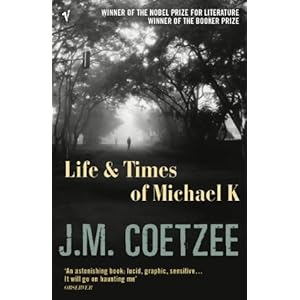 Life and Times of Michael K won the Booker Prize in 1983, and it's been one of Coetzee's books that I've wanted to read for a really long time. The name intrigued me: who is Michael K? And, what is it about his life and times that merits a novel?
Life and Times of Michael K won the Booker Prize in 1983, and it's been one of Coetzee's books that I've wanted to read for a really long time. The name intrigued me: who is Michael K? And, what is it about his life and times that merits a novel?
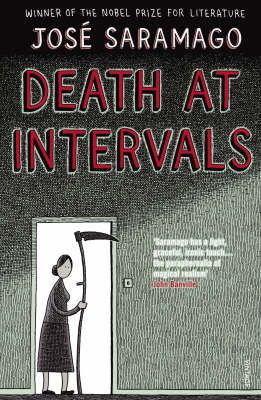 Death At Intervals (also published as Death With Interruptions) is an extremely surreal book by the Nobel Laureate, José Saramago. In a country (not necessarily futuristic), people have stopped dying one new year's day, in spite of illness, accidents and life in general.
The different strata of society react differently: people are initially joyous as they contemplate immortality; the religious people and the philosophers try debating it out - without death, what is the point of religion - and, the politicians, who try and figure out the socio-economic repercussions.
Death At Intervals (also published as Death With Interruptions) is an extremely surreal book by the Nobel Laureate, José Saramago. In a country (not necessarily futuristic), people have stopped dying one new year's day, in spite of illness, accidents and life in general.
The different strata of society react differently: people are initially joyous as they contemplate immortality; the religious people and the philosophers try debating it out - without death, what is the point of religion - and, the politicians, who try and figure out the socio-economic repercussions. I finished this book over two weeks ago, and have been struggling to write the review ever since. I honestly hoped I wouldn't have to drag it into the new year, but there you have it...
This is the first Toni Morrison I've read, and I started the book with great trepidation. I've heard phenomenal things about Toni Morrison, and I was intimidated... unsure of what to expect. I really hoped I'd enjoy the book, and it would make me go out and buy more books by Morrison instantaneously, but unfortunately, I was left feeling fairly indifferent. I didn't like the book. I didn't dislike the book... and I'm not accustomed to having that kind of a reaction to a book - especially as I've mulled over it for about two weeks!
I finished this book over two weeks ago, and have been struggling to write the review ever since. I honestly hoped I wouldn't have to drag it into the new year, but there you have it...
This is the first Toni Morrison I've read, and I started the book with great trepidation. I've heard phenomenal things about Toni Morrison, and I was intimidated... unsure of what to expect. I really hoped I'd enjoy the book, and it would make me go out and buy more books by Morrison instantaneously, but unfortunately, I was left feeling fairly indifferent. I didn't like the book. I didn't dislike the book... and I'm not accustomed to having that kind of a reaction to a book - especially as I've mulled over it for about two weeks!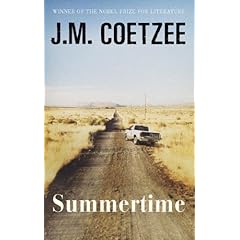 And so, my Booker shortlist (2009) journey continues with Coetzee's fictional memoir, which completes the trilogy, already containing
And so, my Booker shortlist (2009) journey continues with Coetzee's fictional memoir, which completes the trilogy, already containing 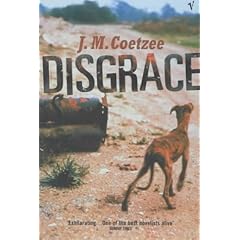 This is the final post on the
This is the final post on the